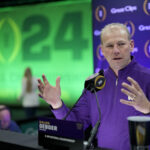Two years later, the specifics remain murky. What was her strategy? Did she have an archetype in mind? Where did she turn for advice? And above all, why him?
But on this point, there is no mystery: Former Washington athletic director Jen Cohen’s decision to hire Kalen DeBoer in late November 2021 was a stroke of genius.
In two seasons, DeBoer has turned the staggering program into an undefeated dynamo on the brink of a national championship. He is 25-2 overall, has won 21 consecutive games and was recently named Associated Press Coach of the Year.
So shrewd was Cohen’s move, in fact, that we’re left wondering about the broader implications in a male-dominated industry: Could it lead to more opportunities for women to run Power Five athletic departments?
“Do I think it will help open doors? Absolutely,” said Patti Phillips, CEO of Women Leaders in Sports and a former small-college basketball coach. “It helps amplify the story that women can lead.
“Football is driving realignment — it’s driving the whole industry. And it’s hard for women to get recognition in the space.”
Of the 69 athletic departments currently competing at the Power Five level, only six are run by women in permanent positions: Duke (Nina King), Missouri (Desiree Reed-Francois), Pittsburgh (Heather Lyke), Vanderbilt (Candice Storey Lee), Virginia (Carla Williams), and USC, which hired Cohen away from Washington last summer.
(A seventh school, Iowa, could join the group: Interim athletic director Beth Goetz is viewed as a strong candidate for the permanent post.)
“We keep adding,” said Phillips, whose company has been focused on the college space for years. “But then we lose one, like Sandy Barbour retiring (at Penn State).”
The problem isn’t with the pipeline. There are qualified candidates serving as Power Five deputies or as athletic directors at the Group of Five level.
Nor does there appear to be steep resistance to female athletic directors from the kings of the sport — the football coaches.
“They are pretty open to it,” Phillips said. “But that’s because most of them are from a newer generation.
“It’s the presidents and chancellors who need convincing. They’re in a bubble, and they get pressure from their donors and former players.”
All of the former players are men.
Most of the major donors are men.
The majority of university presidents and chancellors? Also men.
“There’s an unconscious bias,” Phillips said.
Cohen has declined numerous interview requests to discuss the specifics of the DeBoer hire, including one from the Hotline, so her secret sauce remains hidden from public consumption.
But her football chops are readily apparent:
Cohen played an integral role in the search that brought Chris Petersen to Washington a decade ago and worked closely with Petersen as the sport supervisor for football.
After athletic director Scott Woodard left for Texas A&M, Cohen was promoted to the top spot in Seattle — a move that came nine months before the first of UW’s two appearances in the College Football Playoff.
She was appointed to the CFP selection committee in March but served six months before stepping down to focus on her new responsibilities at USC.
Because Cohen isn’t accompanying DeBoer and the Huskies on their playoff run, Phillips said, it’s easy to overlook the connective tissue.
“Most people are watching Washington closely, but it’s not completely obvious” — that Cohen hired DeBoer — “because she’s not there anymore.”
Even without direct insight from Cohen, we can piece together the key events:
— After Petersen stepped down as Washington’s coach following the 2019 season, Cohen promoted defensive coordinator Jimmy Lake. At the time of the appointment, Lake was one of the hottest young coaches in the sport and had turned down numerous opportunities to leave UW.
— But by late in Lake’s second season, with the program scuttling — and after he was suspended for striking a player — Cohen had no choice but to initiate a change.
— Her national search lasted two weeks and ended with a little-known 47-year-old whose head coaching career consisted of five years at Sioux Falls (Division II) in the 2000s and two seasons running the Fresno State program (2020-21) after Jeff Tedford stepped away for health reasons.
DeBoer’s low profile and understated personality stood in stark contrast to the coaches hired in that same window by two of UW’s chief rivals.
One day earlier, USC had stunned the sport by luring Lincoln Riley away from Oklahoma.
Two weeks later, Oregon hired the hottest coordinator in the country, Georgia’s Dan Lanning.
But time has been kind to Washington. DeBoer is 1-0 against Riley, 3-0 against Lanning and 21-2 against everyone else entering the national championship game against Michigan on Monday night.
By any measure, Cohen’s masterstroke stands as one of the sport’s shrewdest hires in recent memory.
And there are other examples of Power Five football success under female athletic directors:
— Missouri (Reed-Francois) won 11 games and the Cotton Bowl under Eli Drinkwitz, who was named SEC Coach of the Year.
— Duke won 16 games in two years under Mike Elko, who was hired by King and just left Durham to take charge at Texas A&M.
— And at Iowa, Goetz, the interim AD, delighted fans by announcing the removal of offensive coordinator Brian Ferentz, the son of head coach Kirk Ferentz.
But progress in the space is neither swift nor linear.
“We’re chipping away; you can see the slow cultural shifts,” Phillips said. “Huge wins are important, and Jen’s move is a big story right now in the Power Five. The DeBoer hire was transformational.”
Related posts:

Washington head coach Kalen DeBoer (AP Photo/David J. Phillip)
Wilner Mailbag: Washington as “flash in the pan,” ACC risks for Stanford and Cal, next moves for the ‘Pac-2’ and more
New Arizona head footbal coach Brent Brennan, . (AP Photo/Darryl Webb)
Wilner – Washington, Arizona coaching changes: Could the vacancies have been prevented as the sport’s new order takes shape?
Harry, the Washington Huskies mascot, (AP Photo/Ted S. Warren)
Washington’s MBB coaching search: Big Ten move offers Huskies huge opportunity to upgrade program On media: The top-rated games of 2024 (thus far) and how they reflect conference realignment
On media: The top-rated games of 2024 (thus far) and how they reflect conference realignment
Jon Wilner
Jon Wilner has been covering college sports for decades and is an AP top-25 football and basketball voter as well as a Heisman Trophy voter. He was named Beat Writer of the Year in 2013 by the Football Writers Association of America for his coverage of the Pac-12, won first place for feature writing in 2016 in the Associated Press Sports Editors writing contest and is a five-time APSE honoree.
